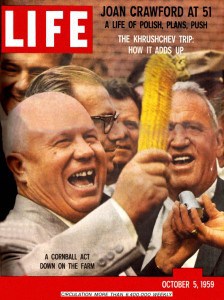It is laid out in the thirteenth chapter of Gregory Freeze’s book, Russia A History, that Khrushchev was not the most likely successor to Stalin; However, he had a great attribute in his ability to relate to the common folk through his concern for popular welfare (409). Khrushchev, after taking power, implemented agricultural reforms specifically though the vast increase of corn cultivation.

Corn, as a fodder (food) crop, was Khrushchev’s proposed solution to the livestock problem, and so it was rampant across agricultural acreage. A particularly productive two years of harvest gave Khrushchev great praise for his “agricultural miracle” and brought corn to the tables of the Soviet Union. There were a surprising amount of newspaper articles about corn during this time, ones about recipes, it’s significance and even about how the youth got involved!

Unfortunately, the Corn Campaign’s success was not as long lived as Khrushchev or the people of the Soviet Union had hoped. Despite news articles emphasizing the importance of mechanization, the agricultural authorities disregarded the need for the creation of more effective methods of corn cultivation. Rather, they increased the acreage of corn cultivation without considering the climate and labor supply in those areas. I find this to be ironic because Khrushchev once got in trouble with Stalin over resisting his “demands for grain deliveries that ignored crop failure and famine” (Freeze 409-410). The cultivating seasons of 1962 proved deadly to the corn and hurt not only Soviet agriculture but also Khrushchev’s reputation.
Honestly, I chose this topic because of the images, but after actually looking into it I now see how it could lead into the question of assessing the “perils” vs. the “promises” of reform after Stalin in that what looked like a promising agricultural move actually brought peril to Soviet agriculture and to Khrushchev as a leader.
Sources:
The Current Digest of the Russian Press [Minneapolis]. 1949. East View Information Services, dlib-eastview-com.ezproxy.lib.vt.edu/browse/publication/6765. Accessed 7 Apr. 2018.
Freeze, Gregory L. Russia: A History. 3rd ed., New York, Oxford UP, 2009.
Von Geldern, James. “Corn Campaign.” Seventeen Moments in Soviet History, WordPress, soviethistory.msu.edu/1961-2/corn-campaign/. Accessed 7 Apr. 2018.
![]() This post earned a “red star” award from the editorial team.
This post earned a “red star” award from the editorial team.

Great post! I was also interested in your post because of the pictures! It’s interesting how something that makes me (us) laugh was actually a very serious concern for the Soviet Union. It think this is a good example of how dedication makes for a positive outcome and how if ignored, problems and dilemmas can come back and reverse all of the progress that has been made.
LikeLiked by 1 person
I agree with Bree (and you!) -The images are compelling, but the back story, which you’ve supported so beautifully using contemporary press accounts, is where the drama lies! Your point about how Khrushchev’s reputation rose and fell based on the successes (and then failures) of the corn project is really apt. The fact that focusing on corn as fodder for livestock (especially cattle) helped raise expectations about increased meat consumption — and the corresponding disappointment when those expectations were dashed, made the stakes even higher. Terrific examples from the Current Digest here — especially the corn recipes! And I love the title of your post!
LikeLike
I totally agree, thanks for reading!
LikeLike
Who knew corn could be so important? It sounds ridiculous but the success of corn was something to hang your hat on. Unfortunately, it came around to bite Khrushchev. Really solid post!
LikeLike
Thank you!
LikeLike
Khrushchev had a great idea and it was unfortunate how it didn’t work out as planned. It would have been great for the country if they prepared better. Increasing the acreage of corn has consequences that should have been accounted for. I enjoyed both the post and photos.
LikeLike
Thanks!
LikeLike
The prime source images you used in your blog post are awesome and I loved seeing them. It really shows how much of an extent that Khrushchev was trying to push corn into the Soviet way of life. His fascination I find incredibly interesting as well. Great blog post!
LikeLiked by 1 person